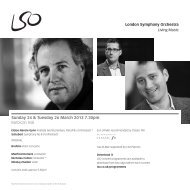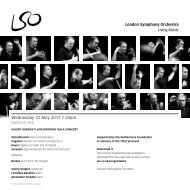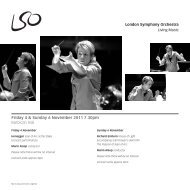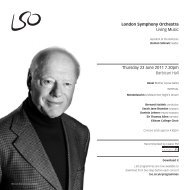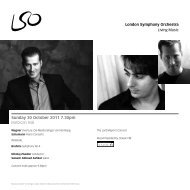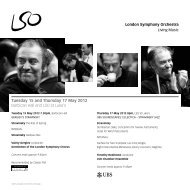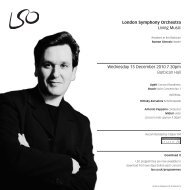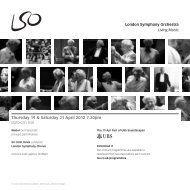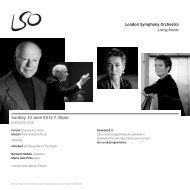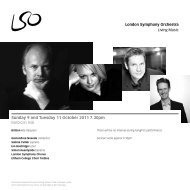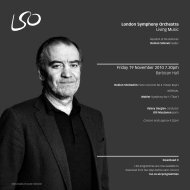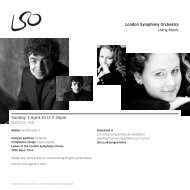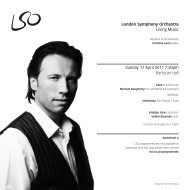25 September programme - London Symphony Orchestra
25 September programme - London Symphony Orchestra
25 September programme - London Symphony Orchestra
You also want an ePaper? Increase the reach of your titles
YUMPU automatically turns print PDFs into web optimized ePapers that Google loves.
Rodion Shchedrin (b 1932)<br />
Piano Concerto No 5 (1999)<br />
Allegretto moderato<br />
Andante<br />
Allegro assai<br />
Denis Matsuev piano<br />
Since Prokofiev and Shostakovich, the number of front-rank<br />
composers who could also claim to be first-rate concert pianists has<br />
dwindled remarkably, and of the remaining few, hardly any have made<br />
piano music as strong a feature of their output as Rodion Shchedrin.<br />
Trained as a composer under Yuri Shaporin and as a pianist under<br />
Yakov Flier, he has composed six piano concertos to date, as well as a<br />
substantial body of solo piano works.<br />
In this area Shchedrin has generally shown more affinity for Prokofiev<br />
than for Shostakovich, especially the concertos, which at least initially<br />
were marked by vivid colours, forceful energy and total absence of<br />
self-doubt. His First Piano Concerto, for instance, a graduation piece<br />
from 1954, was a cheerfully extrovert romp that could have been<br />
designed as a tribute to Prokofiev, who had died the previous year.<br />
Twelve years later, the Second Concerto retained that influence,<br />
alongside a playful indulgence in twelve-note techniques.<br />
However, nearly 20 years separate the first three piano concertos,<br />
all of which Shchedrin premiered and recorded with himself as soloist,<br />
from the last three (No 3 was composed in 1973, No 4 in 1991).<br />
In this second phase, exhibitionism gives way to a more private,<br />
exploratory tone.<br />
The Fifth Piano Concerto was composed in 1999 for Finnish pianistcomposer<br />
Olli Mustonen, who gave the premiere in October that<br />
year with the Los Angeles Philharmonic <strong>Orchestra</strong> under Esa-Pekka<br />
Salonen. Indeed the first movement seems initially designed to<br />
showcase Mustonen’s trademark pecking staccato touch, which is set<br />
off firstly against slow, singing lines, then against attractively scored<br />
scalic flourishes. The extended central section is slightly slower as<br />
well as weightier in tone, and it eventually inspires a more songful<br />
transformation of the opening material. This lengthy movement closes<br />
with a brief return of textures from the first section.<br />
4 Programme Notes<br />
The slow movement opens with an austere orchestral chorale, which<br />
the piano immediately takes up in a short cadenza. Ghosts of the first<br />
movement pass across the stage, but the main musical character<br />
seems to focus on four-note descending figures, highly malleable<br />
but almost always song-like.<br />
In essence a perpetuum mobile, the finale deliberately emulates<br />
the ‘crescendo with music’ of Ravel’s Bolero. For long stretches this<br />
movement demands greater virtuosity from the orchestra than the<br />
soloist, at least in terms of rhythmical precision. Finally the soloist cuts<br />
loose in a cadenza worthy of Shostakovich for its manic leaps, and<br />
when the orchestra rejoins it is with a Prokofievian style mécanique in<br />
overdrive, concluding the work with its most physically exciting pages.<br />
Shchedrin <strong>programme</strong> notes and profile © David Fanning<br />
David Fanning is a professor of music at the University of Manchester.<br />
He is an expert on Shostakovich, Nielsen and Soviet music. He is also<br />
a reviewer for the Daily Telegraph, Gramophone and BBC Radio 3.<br />
INTERVAL: 20 minutes<br />
I still today continue to be convinced that<br />
the decisive factor for each composition is<br />
intuition. As soon as composers relinquish<br />
their trust in this intuition and rely in its<br />
place on musical ‘religions’ such as serialism,<br />
aleatoric composition, minimalism or<br />
other methods, things become problematic.<br />
Rodion Shchedrin<br />
Rodion Shchedrin (b 1932)<br />
The Man<br />
The generation of Soviet composers after Shostakovich produced<br />
charismatic and exotic figures such as Galina Ustvolskaya,<br />
Alfred Schnittke and Sofiya Gubaydulina, whose music was initially<br />
controversial but then gained cult status. At the other end of the<br />
stylistic spectrum it featured highly gifted craftsmen such as<br />
Boris Tishchenko, Boris Tchaikovsky and Mieczysław Weinberg, all<br />
of whom worked more or less within the parameters laid down by<br />
Shostakovich and were highly respected in their heyday but gradually<br />
fell from favour.<br />
Somewhere in between we can locate Rodion Shchedrin – an<br />
individualist with a broader and more consistent appeal, who could<br />
turn himself chameleon-like to virtuoso pranks or to profound<br />
philosophical reflection, to Socialist Realist opera or to folkloristic<br />
Concertos for <strong>Orchestra</strong> (a particular speciality), to technically solid<br />
Preludes and Fugues, to jazz, and, when he chose, even to twelvenote<br />
constructivism.<br />
Trained at the Moscow Conservatoire in the 1950s, as a composer<br />
under Yuri Shaporin and as a pianist under Yakov Flier in the early<br />
years of the Post-Stalinist Thaw, Shchedrin was one of<br />
the first to speak out against the constraints of<br />
musical life in the Soviet Union. He went on to play<br />
a significant administrative role in the country’s<br />
musical life, heading the Russian Union of Composers<br />
from 1973 to 1990. Married since 1958 to the star<br />
Soviet ballerina Maya Plisetskaya, he established a<br />
significant power-base from which he was able to promote<br />
not only his own music but also that of others – such as<br />
Schnittke, whose notorious First <strong>Symphony</strong> received its<br />
sensational premiere only thanks to Shchedrin’s support.<br />
An unashamed eclectic, and suspicious of dogma from<br />
either the arch-modernist or arch-traditionalist wings of<br />
Soviet music, Shchedrin occupied a not always comfortable<br />
position, both in his pronouncements and in his creative<br />
work. With one foot in the national-traditional camp and the<br />
other in that of the internationalist-progressives, he was<br />
tagged with the unkind but not unfair label of the USSR’s<br />
Rodion Shchedrin © www.lebrecht.co.uk<br />
‘official modernist’. From 1992 he established a second home in<br />
Munich, but he still enjoyed official favour in post-Soviet Russia,<br />
adding steadily to his already impressive roster of prizes.<br />
Shchedrin has summed up his artistic credo as follows: ‘I continue to<br />
be convinced that the decisive factor for each composition is intuition.<br />
As soon as composers relinquish their trust in this intuition and rely in<br />
its place on musical ‘religions’ such as serialism, aleatoric composition,<br />
minimalism or other methods, things become problematic.’<br />
Programme Notes<br />
5



